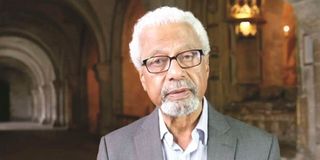Gurnah’s surprise Nobel win: A stranger in a strange land

Abdulrazak Gurnah, winner of this year's Nobel Prize for Literature, The Tanzania-born writer currently lives in the UK.
What you need to know:
- One of his most important works cited by the Nobel Committee was his novel, Paradise.
- It’s a sad story about a 12-year-old boy, Yusuf, sold by his father in repayment of a debt.
“Freud has a wonderful word, ‘afterwardness’… To think about home and the departure from home, about not going home and no longer feeling able to go home, is to be filled with a remarkable sense of ‘afterwardness’: it is too late to do anything about it now, and too late to know what should have been done”.
These words by the English critic James Wood aptly capture the plight of Abdulrazak Gurnah, the quiet Tanzanian-born and now UK-based writer who won the 2021 Nobel Prize for Literature on October 7, 2021.
Gurnah left his home in Zanzibar for England in 1964 after a violent uprising. One can imagine him like other refugees and immigrants wandering in other people’s countries with the aura of dislocation, instability and strangeness that fleeing from home brings.
And in the years since, Gurnah has probably experienced his sense of ‘afterwardness” — thinking about home but probably unable to return. He, therefore, did what other refugees do when miserable, poor and homesick: he started “going home” through writing entries about home in his diary and then later started writing longer stories that gave rise to his first novel.
Having lost his homeland of Zanzibar, the running theme of his literary works seemed to suggest that he never really felt at home anywhere except maybe in the country of words. However, his words, like his personality had silent rather boisterous power. Indeed, if literature were rain, the mercurial Gurnah wouldn’t be the dramatic roar of thunderclaps but the quiet lightning strike with the ability to illuminate even the minutest details; leaving everything exposed in its wake.
Memory of Departure
Gurnah writes in gentle, illuminating prose in The Last Gift that, “One day, long before the troubles, he slipped away without saying a word to anyone and never went back. And then another day, forty-three years later, he collapsed just inside the front door of his house in a small English town. It was late in the day when it happened, returning home after work, but it was also late in the day altogether… He felt it coming, the collapse”.
This paragraph flows gently, like a slow river rather than the sharp drop of a hammer.
One of his most important works cited by the Nobel Committee was his novel, Paradise. It’s a sad story about a 12-year-old boy, Yusuf, sold by his father in repayment of a debt. It’s heartbreaking to imagine the kind of poverty that would make a father sell off his son. Yusuf leaves a simple rural life and is thrown into the complexities of life in precolonial urban East Africa. The author then highlights the colonial world in an intimate portrait. He expertly blends myth with historical fiction.
He is also unapologetic about his roots in the use of Swahili words. “The clearing round the mzambarau tree was empty so early in the day,” he wrote in Memory of Departure. Of course, as the title suggests, in Memory of Departure, as in his other works, he is writing about being uprooted from one’s native place and getting planted in a foreign land. His characters have to learn how to deal with strange people, circumstances and places, all time battling the multiplicity of disguises, masks, and other perils faced by travelers and other refugees.
The characters traverse territories, abandon fixed positions and have to navigate new places, thus have to deal with the sudden shifts of life like the way one has to deal with changing weather – alternating torrential rain with bursts of brilliant sunshine or dark, rainy clouds with little cheer or no cheer.
Going home to Zanzibar
Gurnah joins other wanderers, exiles and émigré writers like Joseph Conrad and Samuel Beckett in imagining their homelands from foreign soil. Conrad lived in the United Kingdom though he was Polish, reportedly with a thick accent. In his most desolate story, “Amy Foster”, Conrad writes about an immigrant who dies while babbling away in a strange language that no one around the dying man could understand.
Edward Said once wrote that, “It is difficult to read ‘Amy Foster’ without thinking that Conrad must have feared dying a similar death, inconsolable, alone, talking away in a language no one could understand”.
Samuel Beckett was English but being a resident of Paris for most of his life, he wrote mostly in French. However, even Beckett ‘went home’ when he started corresponding in English towards the end of his life. Oh home, sweet home!
James Wood writes, “I once saw, in Germany, a small exhibition of Samuel Beckett’s correspondence with his German publisher. Many brief note-cards were arranged chronologically, the last written only a few months before his death. Beckett wrote to his publisher not in German but in French, a language in which he was deeply at home; but in the final year of his life, he switched to English. ‘Going home,’ I thought”.
Beckett switched to writing the letters in English, his native tongue, as he neared his death. Going home to Zanzibar, albeit metaphorically, is what Gurnah has been trying to do through his literary works. In his world, Zanzibar is just a poignant word away. And he has been awarded a Nobel Prize in Literature for it.





